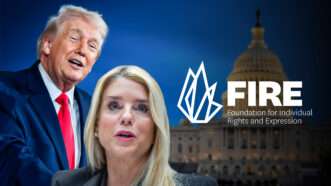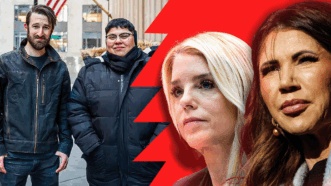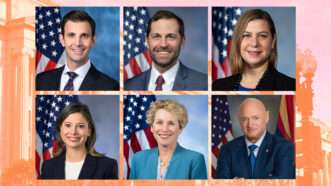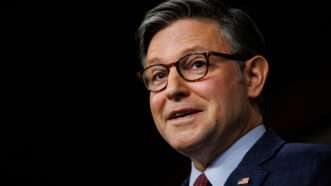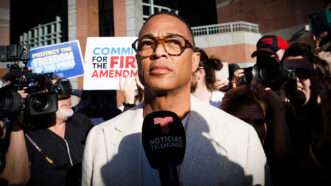Free Speech
Trump Administration May Grant Asylum to Turkish National Who Burned a Quran in the U.K.
Like free speech in the U.K., the White House’s interest in this case shows that free speech is for some, but not for all.
Teacher's First Amendment Claim Related to Sharing "What Is Privilege?" Post Can Go Forward
"Superintendent Hamlet testified that Defendants viewed the Privilege Post as a criticism of the Black Lives Matter ... movement. He did not think such criticism was valid and believed criticism of BLM was enough in itself to justify punishing a teacher."
Stephen Colbert Says CBS Killed an Interview Because of FCC Equal-Time Rule
If anything, the incident just provided further proof that the equal-time rule should be abolished.
Security Clearance Denied for Past Child Porn Downloading; Hearing Officer Unmoved by Claims That Behavior Stemmed from Since-Resolved Gender Dysphoria
"Applicant believed she was pre-adolescent or during adolescence when she was downloading images of children on her computer in 2013 to 2014 even though she was chronologically about 30 years old."
Carnegie Mellon Must Provide Discovery About Relationship with Qatar, in Ex-Student's Lawsuit Alleging Anti-Semitism
The student was explaining the concept of an eruv, a feature of certain Jewish neighborhoods, in class to an architecture professor, who allegedly said the time the student had spent on project "would have been better spent if [Ms. Canaan] had instead explored 'what Jews do to make themselves such a hated group.'" …
The Trump Administration's War Against ICE Critics
By conflating opposition with terrorism, federal officials go down a dangerous path.
Trump's Blatantly Unconstitutional Attempt To Punish His Congressional Critics Hits 2 Roadblocks
A grand jury and a federal judge rejected the president’s vendetta against legislators who produced a video about the duty to refuse unlawful military orders.
The Olympics Will Never Achieve World Peace If It Keeps Clamping Down on Free Speech
Plus: Olympic hockey almost didn’t happen, how to pad the medal count, and a reader survey on fixing the Olympics
No Pseudonymity for Man Suing Harvard Alleging Jews Aim "to Exterminate or Enslave All Non-Jews"
The plaintiff claims he was denied admission to Harvard Business School, apparently because he is a "non-veteran, non-queer, non-Jewish White male applicant[]."
Trump's FTC Chairman Sends a Threatening Letter to Apple for Not Promoting Enough Conservative Media
Chairman Andrew Ferguson continues the Federal Trade Commission’s crusade against free speech with an official letter to Apple CEO Tim Cook.
Mr. Wonderful v. BitBoy Crypto: Shark Tank's Kevin O'Leary Awarded $2.8M in Defamation Suit
Defendant has apparently "informed his psychiatrist ... that he believes he is dead and in a waiting room for Hell."
Journal of Free Speech Law: "Cancel Culture and the Constitution: Three Reasons Why We Should Embrace Free Speech," by Judge James Ho
Based on a Constitution Day Lecture delivered at Wofford College last September 11.
The Feds Used Threats To Silence Their ICE-Tracking Speech. Now They're Fighting Back.
A lawsuit argues that Pam Bondi and Kristi Noem coerced Apple and Meta to censor two popular ICE-monitoring tools, which violates Americans' right to freedom of expression.
Libel Suit by "King of Vape" Against N.Y. Post, Over Allegations of Misconduct and Anti-Israel Actions, Thrown Out but May Be Refiled
A district court concluded plaintiff had adequately alleged (it's all just allegations at this point) that the article included false and defamatory statements, but hadn't adequately alleged the statements were knowingly or recklessly false, and hadn't adequately alleged damages.
A Grand Jury Rejects Trump's Attempt To Prosecute 6 Legislators for Saying Something He Did Not Like
The president was offended by a video reminding military personnel of their duty to disobey unlawful orders.
An Immigration Judge Finds No Legal Basis To Deport a Student Arrested for an Op-Ed
Rumeysa Ozturk is one of several international students targeted by the Trump administration's speech-based deportation policy.
Tariff-ied
Plus: An immigration court drops Rumeysa Ozturk's deportation case, Buddhist monks complete their "walk for peace," previously classified Nixon grand jury testimony is released, and more...
Jimmy Lai Got a 20-Year Sentence for Saying Things the Chinese Government Didn't Like
China's "national security law" was perfectly tailored to zero in on someone like Lai, who vigorously pushed for democracy, freedom of speech, and government reform in Hong Kong.
Allegedly Tortious Disclosure of Candidate's Sexual Assault Allegations in Judicial Campaign
"Defendant Cline also showed former Defendant Joshua Woolsey [whose wife was then running for judge against plaintiff] an unredacted copy of the [sexual assault police report filed by the plaintiff] ... after Joshua Woolsey made a public records request for all records pertaining to Plaintiff."
A First Amendment Lawsuit Challenges FTC Chairman Andrew Ferguson's Vendetta Against NewsGuard
The commission has targeted the news rating company with onerous record demands and a merger condition aimed at cutting off its revenue.
Half-Hearted Halftime Outrage
Plus: Jimmy Lai sentenced to 20 years in prison, endemic fraud in federal welfare, Ghislaine Maxwell won't talk to Congress, and more...
Defendant's Giving E-Mail Address as Prosecutor's Name + "suxcox696969@gmail.com" Isn't Contempt of Court
Readers, these are trained pro se litigants; do not try this at home (especially since other courts might disagree).
"Any Business in America Would Rather Not Have Their Internal Documents out in the Public"
"But that does not mean that litigants have a right to hide them from the public once they are implicated in court proceedings."
Fourth Circuit Rejects Facial Challenge to Two Trump Anti-DEI Executive Orders
"What plaintiffs are really asking us to do is read subtext into the Provision's text."
Don Lemon May Be a Hack, but That Does Not Make Him a Felon
The federal case against the former CNN anchor hinges on conduct that can plausibly be viewed as part of a journalist's work, combined with the obvious partiality of that work.
Environmentalists and MAHA Activists Say Bill To Expand Florida's 'Food Libel' Law Will Silence Critics
The bill has a wide variety of groups worried that they could be targeted for criticism of large agribusinesses.
Arizona Bill Would Make It a Felony for Parents To Bring Their Kids to Drag Shows
Yes, that includes drag queen story hour.



